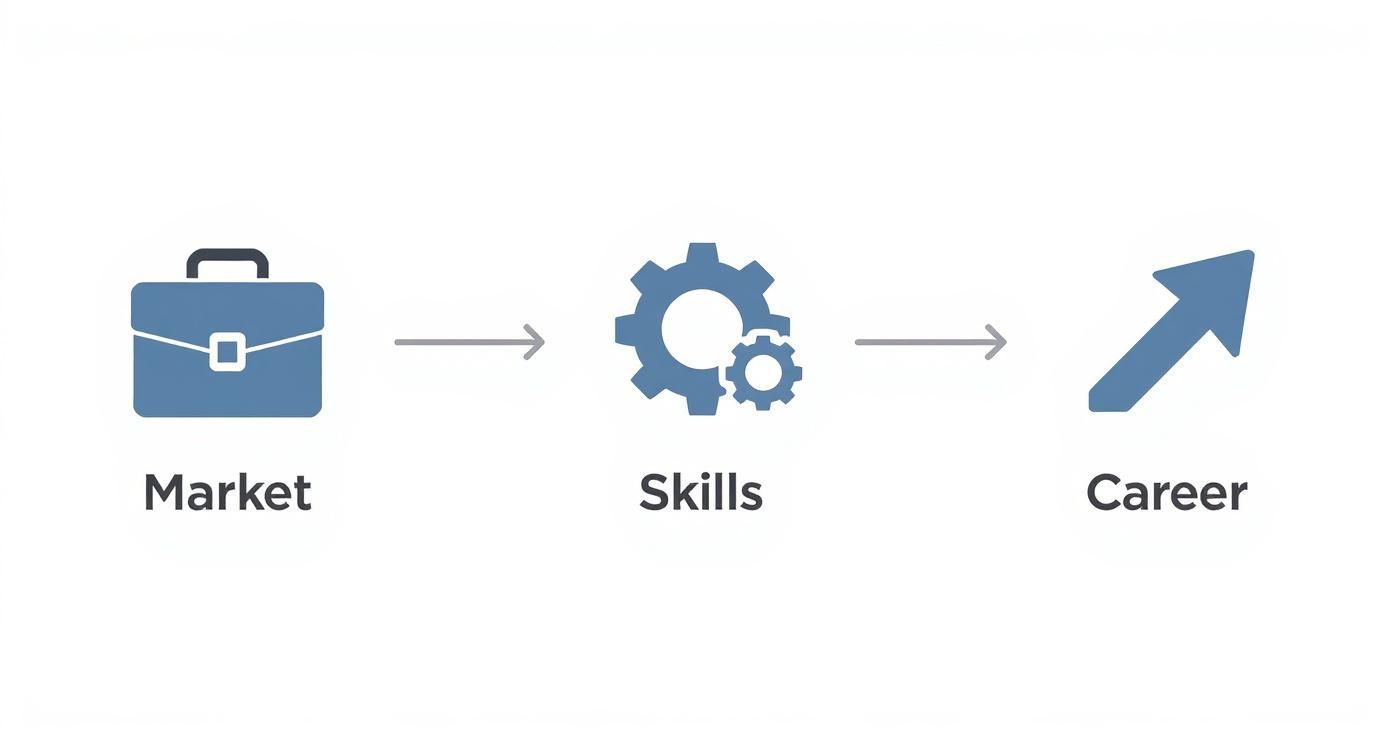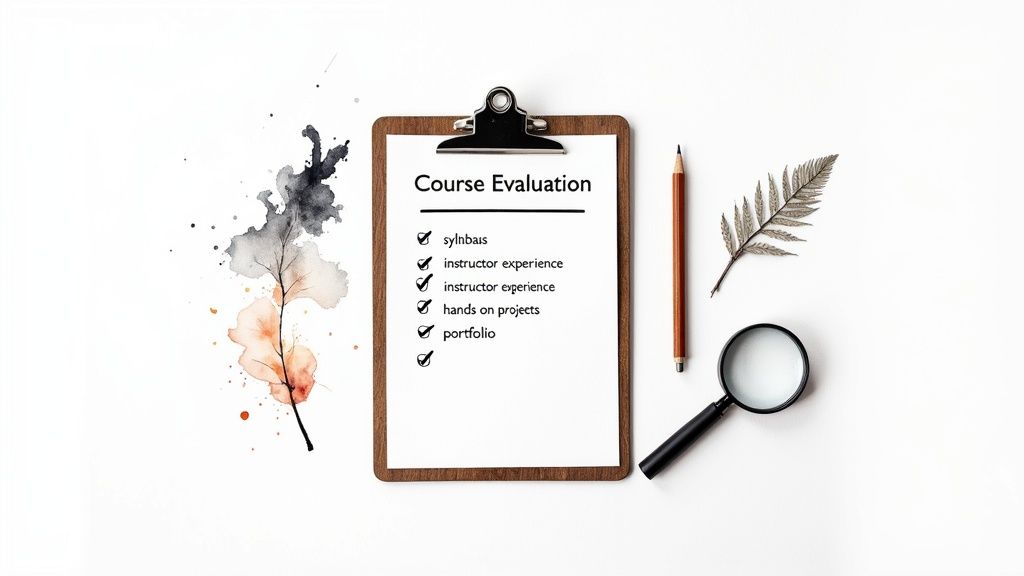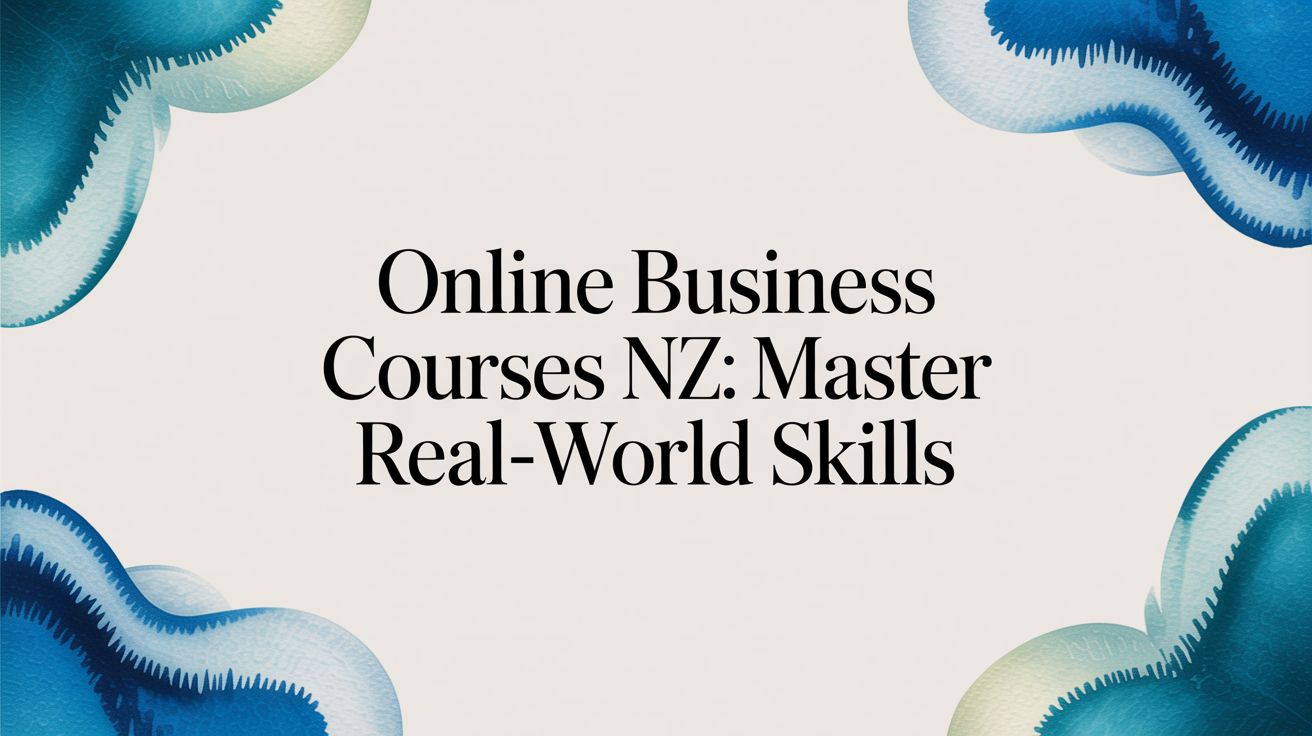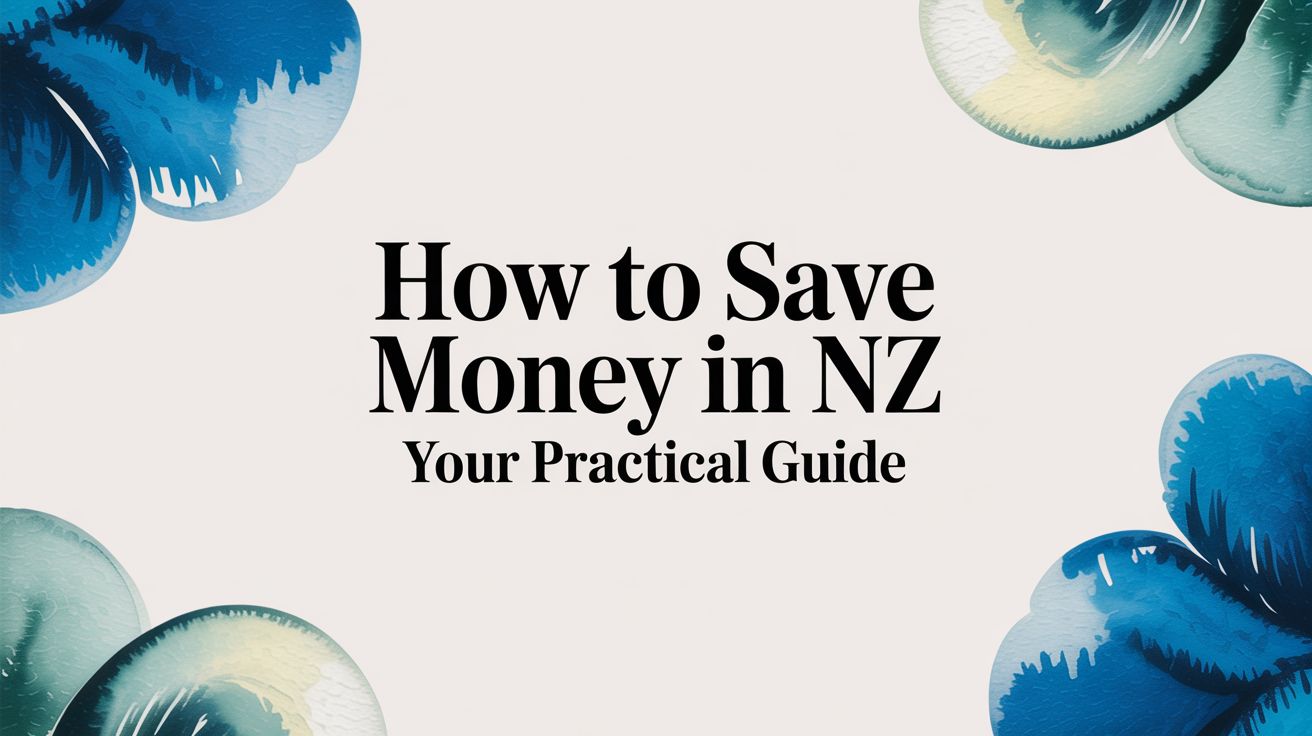
Top Digital Marketing Classes to Boost Your NZ Career
Finding the right digital marketing class in New Zealand boils down to one thing: practical, job-ready skills you can use from day one. This guide breaks down the core disciplines—from SEO to social media—and helps you pick a learning path that aligns with your career goals, whether you’re in Auckland, Wellington or studying online.
Treat this as your personal roadmap to navigate the many courses on offer and invest in a programme that delivers real-world results.
How To Find The Right Digital Marketing Class In NZ
Digital marketing sits at the heart of Kiwi businesses these days. Whether a café in Queenstown is using Instagram to reel in tourists or an Auckland tech firm is running Google Ads to win clients overseas, the demand for skilled digital marketers has never been higher.
You’ll find plenty of courses promising to give you “all the skills”, but not every class lives up to the hype. In New Zealand’s fast-paced job market, employers increasingly focus on what you can do—from crafting winning campaigns to analysing real data—over simply ticking a box on a certificate.
Focus On Job-Ready Skills Over Formal Qualifications
Here’s an analogy: you could spend months memorising recipes in a cookbook, or you could jump behind the stove and start cooking tonight. While theory has its place, it’s the hands-on work that turns you from beginner to confident marketer.
Some training providers choose agility over a formal stamp, which lets them update their syllabus as the industry shifts.
Top Courses Let You Build Your Portfolio From Day One. Instead of memorising buzzwords, you’ll launch ad campaigns, draft SEO-friendly content and pull live analytics reports.
What To Look For In A Kiwi Context
Local flavour matters. A class that dives into successful Kiwi campaigns—think Whittaker’s chocolate launches or Allbirds entering the NZ market—delivers far more actionable insights than generic overseas examples.
At a minimum, look for:
- Practical Projects: Tasks designed to mirror real client briefs and bulk up your portfolio.
- Industry Tools: Hands-on practice with Google Analytics, Meta Ads Manager, email platforms and e-commerce dashboards.
- NZ-Relevant Content: Case studies from New Zealand brands, local market insights and consumer behaviour research.
Your aim? A course that leaves you job-ready from day one. Exploring a variety of digital skills courses can give you a clearer idea of the practical pathways available today.
What You Will Actually Learn in These Courses
Jumping into a digital marketing class can feel like you're learning a completely new language. But instead of verbs and nouns, you're picking up the skills that help businesses not just survive, but truly thrive online. At their heart, these courses are designed to take complex online strategies and break them down into practical, easy-to-grasp pieces.
Think of it this way: if your business is a shop, digital marketing skills are everything you need to design the best sign, pick the perfect spot on the high street, and create an experience that keeps people coming back for more.
So, let’s unpack the core skills you'll actually be getting your hands on.

This chart shows how understanding the market, gaining the right skills, and having clear career goals all connect. It’s about creating a powerful path to success by lining up your learning with what the industry needs and what you want to achieve.
To give you a clearer picture, let's break down the main disciplines you'll encounter.
Core Digital Marketing Disciplines at a Glance
This table offers a quick snapshot of the key areas covered in most digital marketing programmes, what they aim to achieve, and some of the common tools you'll get familiar with.
Each of these disciplines is a specialty in its own right, but a great introductory course will give you a solid foundation across the board. Now, let’s look at what each one involves in a bit more detail.
H3 Mastering Search Engine Optimisation
Search Engine Optimisation (SEO) is the craft of making a website more attractive to search engines like Google. Picture your website as a book in a gigantic library. SEO is how you make sure the librarian knows exactly what your book is about and recommends it to every single person searching for that topic.
You’ll learn how to find the right keywords—the exact phrases Kiwis are typing into Google—and weave them naturally into your website. This isn’t about just stuffing words in; it’s about creating genuinely helpful content that answers real questions for your audience.
A good course will also dive into the technical side, like boosting your site’s loading speed and making sure it looks and works perfectly on a mobile phone. These details are crucial for keeping both your visitors and Google happy.
H3 Running Paid Advertising Campaigns
While SEO is a long game for attracting visitors for free, Pay-Per-Click (PPC) advertising is all about getting results much faster. Think of it like renting a massive billboard on the busiest digital motorway in the country. You pay a small fee each time someone clicks on your ad, which pops up right at the top of search results or in their social media feed.
In a quality digital marketing class, you’ll learn how to:
- Set up campaigns on powerhouse platforms like Google Ads and Meta (Facebook) Ads.
- Target specific audiences based on their location, interests, and online habits—perfect for reaching customers from Invercargill to Cape Reinga.
- Write compelling ad copy that actually grabs attention and makes people want to click.
- Manage a budget effectively to make sure you’re getting the best possible return on every dollar spent.
This is an incredibly powerful skill because it gives businesses the ability to generate leads and sales almost instantly.
H3 Engaging Through Social Media Marketing
Social media is so much more than just posting random updates. It’s about building a genuine community around your brand. It’s the digital version of being that friendly local shop owner who knows everyone by name and always has time for a chat.
You'll learn how to pick the right platforms for a business—whether that’s Instagram for a visual brand like a local cafe, or LinkedIn for a B2B consultancy. The real focus will be on creating content that sparks conversations and builds lasting relationships, not just shouting about your latest sale. Some programmes will even cover the practical side of using the best influencer marketing tools to manage and analyse campaigns.
The importance of this skill in New Zealand can’t be overstated. With social media use reaching 79.1% of the population in early 2025, that's around 4.14 million Kiwis who are active users. They spend an average of 2 hours and 3 minutes on these platforms every day, making social media a non-negotiable channel for businesses wanting to connect.
H3 Creating Value with Content and Email Marketing
Content Marketing is all about creating and sharing valuable, free material—like blog posts, videos, or handy guides—to attract people and eventually turn them into customers. It’s about positioning yourself as a helpful expert, not a pushy salesperson. For instance, a Kiwi-owned garden store could create blog posts on "How to Grow Tomatoes in a Small Auckland Garden."
By providing useful information, you build trust and establish your brand as an authority. This makes customers far more likely to choose you when they're finally ready to buy.
A close cousin to this is Email Marketing, which is one of the most direct ways to talk to your audience. You'll learn how to build an email list from scratch, design newsletters that look great, and write messages that people actually want to open. This is all about nurturing those relationships over time, turning one-off buyers into loyal advocates for your brand.
H3 Making Sense of Data with Analytics
Finally, none of these marketing efforts mean a thing if you can't measure what’s actually working. Analytics is the skill of turning raw data into smart marketing decisions. It’s like having a dashboard for your business that tells you exactly where your customers are coming from and what they’re doing on your site.
You’ll get comfortable using tools like Google Analytics to track website traffic, conversion rates, and user behaviour. This is what allows you to stop guessing and start making data-driven choices that consistently improve your campaigns and grow the business.
Choosing Your Ideal Learning Pathway
Finding the right digital marketing classes in New Zealand isn't a one-size-fits-all deal. The perfect course for a busy parent in Tauranga wanting to launch a side hustle will look worlds apart from what a recent grad in Wellington needs to land a corporate gig.
Your path really depends on your goals, how you learn best, and the time you can realistically carve out. Think of it like planning a trip. Are you after a self-guided roadie where you call the shots, a structured bus tour with a set schedule, or an immersive local experience? Each gets you to your destination, just in a different way.
Navigating Different Learning Formats
The first big decision is picking a format that actually fits your life. Getting this right is the key to finding a course you'll not only start, but actually finish.
Here’s a quick rundown of the main options:
- Self-Paced Online Courses: These offer total flexibility, letting you learn whenever and wherever works for you. They’re a lifesaver for Kiwis juggling work, whānau, or other commitments.
- Live Virtual Classrooms: Think of these as scheduled online classes with a real instructor and classmates. They bring more structure and let you ask questions on the spot, which is great for keeping you accountable.
- In-person Workshops: These are intensive, hands-on sessions at a physical spot. They’re fantastic for networking and getting direct, face-to-face help from your tutors.
Being honest about your own habits is crucial here. If you're a self-starter, a self-paced course feels liberating. But if you thrive on schedules and group energy, a live virtual or in-person format is probably a better bet. You can dig into this a bit more by exploring the difference between active vs passive learning methods, which can really help pinpoint the style that makes things click for you.
Formal Qualifications vs Practical Certifications
Another fork in the road is the choice between formal qualifications and practical, industry-focused certifications. A formal diploma from a polytech or college usually involves a longer, more academic curriculum. It's a comprehensive route, but can sometimes lag behind the lightning-fast changes in the digital world.
On the flip side, many modern providers focus squarely on delivering practical, skill-based training without lengthy academic requirements. These courses are built to be nimble, constantly updating their content to teach the exact tools and tactics being used in the industry right now.
For a growing number of New Zealand employers, a strong portfolio packed with real projects is now more valuable than a traditional piece of paper. They want proof you can actually run a campaign, make sense of the data, and get results.
This shift towards valuing what you can do is a huge reason why these industry-focused digital marketing classes have taken off. They offer a more direct—and often much faster—path to becoming job-ready.
The boom in online education across New Zealand really hammers this home. Projections show the market is set to hit US$400.58 million in revenue by 2025, driven by Kiwis hunting for flexible, career-focused learning outside the old-school system. You can read more about the expansion of New Zealand's online education market on Statista.
At the end of the day, the best pathway is the one that gives you real, tangible skills you can prove. Whether you're starting from scratch or levelling up, picking a learning format and course type that lines up with your career goals will set you up for success.
A Practical Checklist For Evaluating Any Course

Use this list to cut through marketing fluff and zero in on courses that equip you with genuine skills. Whenever a brochure throws around terms like “industry standard”, it pays to dig a little deeper.
First, match the syllabus to your career goals. Then, size up the tutor’s real-world experience, weigh up time versus cost, and make sure there’s hands-on work to build your portfolio.
Assessing The Course Syllabus
Think of the syllabus as your learning blueprint. Scan the module list for topics that align with New Zealand’s market needs:
- SEO optimised content strategy with NZ-focused examples
- PPC campaign setup and budget management
- Social media tactics tailored to Kiwi audiences
Block out time to compare a live demo (for example, a Google Ads walkthrough) against a generic slide deck. A current syllabus is like a reliable GPS — it keeps you on track and away from outdated detours.
A Current Syllabus Is Like A Reliable GPS — It Keeps You On Track And Away From Outdated Detours.
Also check for tool-specific training: Google Analytics, Meta Ads Manager and leading email platforms. If local employers use it, you should too.
Evaluating Instructor Experience
Who’s at the helm matters as much as what you’ll learn. Seek tutors who have run actual campaigns in Wellington, Auckland or Christchurch, not just lectured about them.
Ideally, your tutor will reference recent projects for Kiwi brands, giving you inside tips on applying strategies down under.
Prioritise Hands On Learning
Theory without action is like a cookbook without a kitchen. Quality classes guide you through real-life briefs so you can:
- Create a mini SEO audit
- Design a social media schedule for a local business
- Launch a small Google Ads trial with a fixed budget
This concrete work not only teaches you to manage time and solve problems on the fly but also builds a tangible portfolio you can show employers.
Balancing Price And Time
Fees range from free workshops up to $2,000 bootcamps. Commitments swing from a few hours each week to full-day intensives. Use this simple formula to compare value:
Value Rating = (Practical Hours + Local Relevance) ÷ Cost
A 20-hour course at $800 with in-market case studies will score higher than a 5-hour webinar at $150.
• See if there’s a trial or sample lesson before you sign up.
• Check clear refund policies to avoid sunk costs.
• Confirm that assignments fit into your spare time.
Remember, the cheapest option isn’t always the smartest career move.
Building A Portfolio With Local Case Studies
Working on New Zealand examples helps you stand out at interview time. Ask if the course supplies editable templates and detailed feedback for projects such as:
- Analysing a Kiwi e-commerce site’s conversion funnel
- Drafting email sequences for a regional retailer
- Crunching web analytics from a tourism board
Each piece becomes a showcase on your CV, proving you understand the challenges local businesses face.
By running through this checklist, you’ll strip away the buzzwords and find digital marketing courses that genuinely deliver. Next, apply these criteria as you research and enrol in a programme that matches your goals, budget and schedule. Good luck on your learning journey!
Mapping Your Career Path After The Course
Stepping out of a digital marketing class in New Zealand is like holding a freshly minted toolkit—you can tackle real roles across startups, government agencies and large corporates.
As Kiwi businesses double down on e-commerce and social media, they’re hunting for people who can design campaigns and dig into analytics from day one.

Entry-level positions—think Marketing Assistant or Coordinator—often focus on supporting campaigns and crunching performance numbers.
After a couple of seasons in the field, many marketers step into roles such as Digital Marketing Specialist, SEO Analyst or Social Media Manager.
At the top end, titles like Marketing Director, Head of Digital or Content Strategy Lead come with broader strategy responsibilities and team leadership.
According to Careers in NZ, annual salaries range from $40,000 to $200,000, and there are around 250 active vacancies for digital marketing roles.
For a deeper dive, see Career insights on kiwieducation.com.
Potential Digital Marketing Roles and Salary Ranges in NZ
Here’s an overview of common digital marketing job titles in New Zealand and what you can typically expect to earn.
This snapshot shows how digital marketing training can guide you through every stage of your career.
Across the board, expanding sectors include:
- E-commerce, with more Kiwi retailers building online stores
- Tourism, where creative campaigns lure travellers back to Aotearoa
- Professional services, relying on targeted ads and analytics to win business
“Building a strong portfolio and embracing constant learning keeps you ahead in this field.”
Your portfolio is your best argument when applying for paid work or pitching to clients. Make sure it features real examples of SEO audits, ad campaigns and email newsletters you’ve crafted.
Building A Freelance Business
Turning class projects into real client work can launch a side hustle or a full-time venture.
Freelancers in New Zealand often set rates between $50 to $120 per hour, depending on experience and niche.
Start by:
- Defining a niche that matches your strengths and local demand
- Showcasing your best work, even if it began as a training exercise
- Writing clear proposals that outline deliverables and fees
- Networking on LinkedIn, at business events and in small business forums
Advancing With Continual Learning
Senior roles like Head of Digital or Marketing Director usually call for deep expertise in areas such as analytics, e-commerce or content strategy.
Ongoing training—focused on the latest platforms, advanced tools and NZ case studies—helps you stand out to employers.
Join groups like Digital Marketing NZ for peer support, and tune into webinars to keep your skills fresh.
Continuous learning propels career growth and adaptability.
Next Steps With Prac Skills
Prac Skills offers bite-sized, hands-on digital marketing courses crafted for busy Kiwi professionals and whānau.
You’ll tackle real briefs, develop a portfolio of local case studies and earn certification recognised by ICOES and CPD.
For more practical advice, read our guide on small business marketing strategies.
Ready to chart your own path? Enrol in a Prac Skills course and turn those new skills into roles that flourish in the NZ economy.
Your Next Step Into Digital Marketing
Setting sail on digital marketing starts with real action. You’ve studied how SEO, PPC and analytics drive campaign success. Now, imagine rolling up your sleeves and turning those insights into live projects.
At Prac Skills, we treat every module as a chance to craft something tangible—something you can showcase to a future employer. Rather than walking away with just a certificate, you graduate armed with real examples of your skills in motion.
- Flexible self-paced lessons that slot into work and whānau life
- Briefs reflecting authentic Kiwi business scenarios
- Guidance from industry experts who refresh content each term
Explore Prac Skills Courses
Our digital marketing courses are built for New Zealand learners ready to dive straight into hands-on tasks. No pushy calls, no hidden fees—just clear steps to get you started.
- Pick a level, from Beginner through to Advanced
- Work through bite-sized modules, each with a defined goal
- Submit practical assignments and receive constructive feedback
“Building real campaigns and analysing live data gave me the confidence to land my first role”
— Prac Skills Graduate
With every module you complete, your portfolio swells—SEO audits, ad mock-ups and social media plans for genuine New Zealand brands.
Compare Learning Formats
- Modules are accredited by ICOES and CPD
- Instant access to new materials and regular updates
- Optional one-on-one sessions for personalised support
Making It Happen Today
Choosing Prac Skills means you focus squarely on building a job-ready portfolio that speaks for itself. With zero entry barriers, you can sample lessons at no cost and decide if it’s right for you.
To get started, review the briefs, estimate your time commitment and secure your spot. Remember, progress is a series of small wins.
Ready to take the next step? Visit Prac Skills to browse courses and kick off your digital marketing journey.
You’ll receive:
- Lifetime access to updated course materials
- Future enhancements and ongoing guidance
- Briefs based on real NZ challenges, from local e-commerce surges to tourism campaigns
And enjoy:
- A 7-day money-back guarantee for full peace of mind
- Free sample lessons before you commit
- A supportive community forum for peer feedback
Enrol now and see your confidence build with every project you complete. Your next job or side hustle is closer than you think.
Take action and succeed.
Frequently Asked Questions
Do I Need A University Degree
Forget the idea that a formal degree is your golden ticket. In New Zealand, employers care far more about tangible results than transcripts. Imagine your portfolio as a chef’s tasting platter—each campaign you’ve run is a bite-sized sample of your expertise.
“In many Kiwi roles, skills and real-world outcomes take precedence over degrees.”
I’ve seen plenty of successful digital marketers without a degree. They leaned into project work, picked up key certifications, and let their campaign wins do the talking.
How Long To Become Job Ready
There’s no one-size-fits-all answer—it really comes down to how deep and how fast you want to go.
- 4–12 Week Bootcamps for rapid, tool-focused training in SEO, PPC, analytics and social media
- 3–6 Month Courses for a deeper dive into strategy, data analysis and end-to-end campaign planning
- Portfolio Projects woven throughout both formats so you graduate with real NZ case studies
If you’re juggling a full-time job, a self-paced, longer course can slot around your workday. Conversely, short, intense bootcamps get you hands-on quickly and often demand full immersion.
Are Online Classes As Effective
You might wonder if online learning stacks up against face-to-face sessions. In my experience, a well-designed virtual course can match—or even outperform—traditional classroom settings.
- Study modules on your own timetable, no commute required
- Tap into live Q&A sessions and vibrant community forums
- Revisit recorded lessons whenever you need a refresher
- Access expert tutors based in Auckland, Wellington and beyond
That said, always check for NZ-focused examples—think Wellington café ad briefs or a Christchurch e-commerce launch—to ensure you’re learning skills you can apply right here at home.
“Online learning opened doors I never thought possible outside main centres”
— Kiwi Digital Marketing Graduate
Ready to dive into hands-on digital marketing training? Explore practical, New Zealand-focused classes made for busy Kiwis at Prac Skills.
Start learning today.
.webp)

